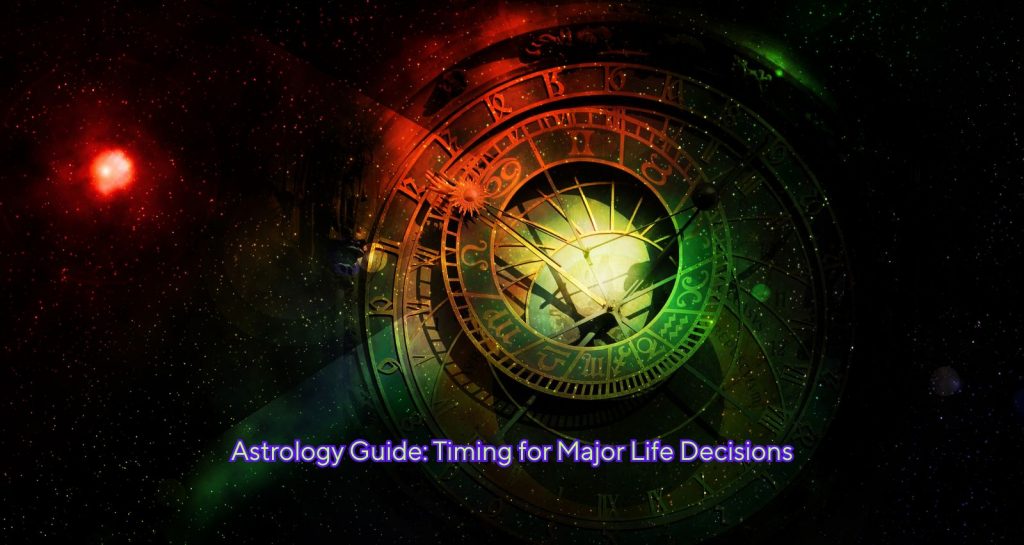The Astrology of Timing: How to Use Transits & Progressions for Major Life Decisions

Introduction
Astrology is more than just sun signs—it’s a powerful tool for understanding life’s rhythms. When it comes to making major decisions—career changes, relationships, relocations, or personal transformations—timing is everything. By analyzing transits and progressions, astrologers can identify the most auspicious moments to act, wait, or reflect.
In this guide, we’ll explore:
- The difference between transits and progressions
- How to track key astrological cycles
- Interpreting major transits (Saturn Return, Jupiter Expansion, Pluto Transformations)
- Using secondary progressions for long-term planning
- Real-life examples of astrological timing in action
Whether you’re an astrology enthusiast or a curious beginner, this guide will help you harness the cosmos for better decision-making.
1. Understanding Transits vs. Progressions
Transits: The Moving Planets
Transits occur when current planetary positions interact with your natal chart (birth chart). These are real-time movements and represent external events, opportunities, and challenges.
Key Transits to Watch:
- Saturn Transits (Karma, Lessons, Structure)
- Jupiter Transits (Luck, Expansion, Growth)
- Pluto Transits (Transformation, Power, Rebirth)
- Uranus Transits (Sudden Change, Innovation)
- North Node Transits (Destiny, Soul Growth)
Progressions: Your Inner Evolution
Progressions (specifically secondary progressions) symbolize your internal growth. They use a symbolic day-for-a-year method, where each day after birth represents a year of life.
Key Progressed Aspects:
- Progressed Moon (Emotional shifts)
- Progressed Sun (Identity changes)
- Progressed Mercury (Mindset evolution)
- Progressed Venus (Love & values shifts)
Transits = External Events | Progressions = Internal Growth

2. Major Transits & Their Impact on Life Decisions
A. Saturn Return (Age 27-30, 57-60)
Themes: Maturity, responsibility, life structure
Decision Impact: Career shifts, marriage, financial stability
Example: If Saturn is transiting your 10th house (career), it’s time to solidify professional goals. Delaying decisions may lead to frustration, while proactive planning brings rewards.
B. Jupiter Transits (Expansion & Opportunity)
Themes: Luck, growth, new horizons
Decision Impact: Ideal for starting businesses, travel, education
Example: Jupiter in your 9th house? A great time to go back to school or explore international opportunities.
C. Pluto Transits (Transformation & Power Shifts)
Themes: Deep change, rebirth, control issues
Decision Impact: Major life overhauls—ending toxic relationships, career reinvention
Example: Pluto in your 7th house? A relationship may undergo a power struggle or profound transformation.
D. Uranus Transits (Sudden Change & Liberation)
Themes: Freedom, rebellion, unexpected shifts
Decision Impact: Career changes, breakups, spiritual awakenings
Example: Uranus in your 6th house? You might suddenly quit a job or adopt a radical health routine.
3. Progressions & Long-Term Planning
A. Progressed Sun Changes (Identity Shifts)
- Progressed Sun into a new sign: A shift in self-expression (e.g., from Leo to Virgo may make you more detail-oriented).
- Conjunct Natal Planets: A time of personal reinvention.
B. Progressed Moon Cycles (Emotional Evolution)
- Changes signs every 2.5 years: Reflects shifting emotional needs.
- Progressed New Moon: A fresh start in life.
C. Progressed Mercury, Venus, Mars (Mind & Relationships)
- Progressed Mercury retrograde? A time for reflection before big decisions.
- Progressed Venus in Aries? You may become more assertive in love.
4. Combining Transits & Progressions for Perfect Timing
The most powerful decisions come when transits and progressions align.
Example:
- Transit Jupiter enters your 10th house (career luck), while your Progressed Sun moves into Capricorn (ambition).
- Result: An ideal time for a promotion or launching a business.
Another Example:
- Transit Saturn squares your natal Venus (relationship challenges), while your Progressed Moon enters Scorpio (emotional intensity).
- Result: A make-or-break period for partnerships.
5. Practical Steps to Track Your Astrological Timing
- Get Your Natal Chart (Use sites like Astro.com or Cafe Astrology).
- Track Current Transits (Check ephemeris or astrology apps like TimePassages).
- Calculate Progressions (Secondary progressions are most common).
- Journal Planetary Shifts (Note how transits/progressions impact you).
- Consult an Astrologer (For personalized timing advice).
Conclusion: Mastering the Art of Cosmic Timing
Astrology doesn’t dictate fate—it provides a celestial roadmap. By understanding transits and progressions, you can make empowered decisions, avoid unnecessary struggles, and align with your most auspicious timing.
Next Steps:
- Study your next Saturn Return phase.
- Track Jupiter’s transit for upcoming opportunities.
- Observe your Progressed Moon for emotional trends.
